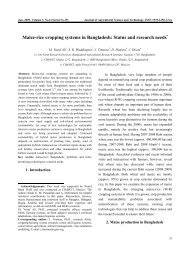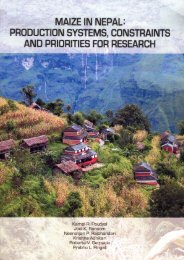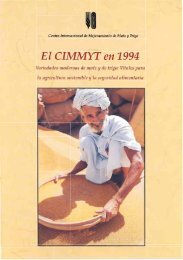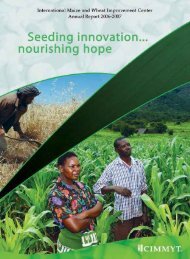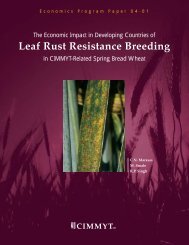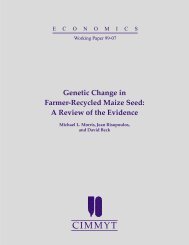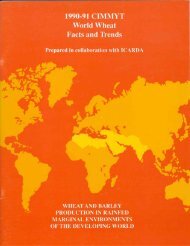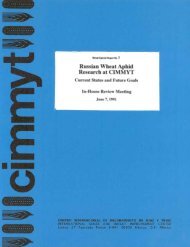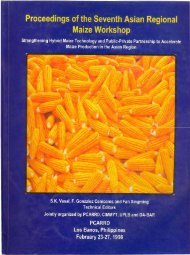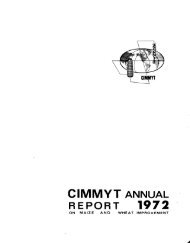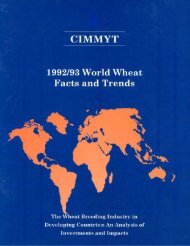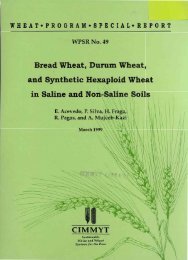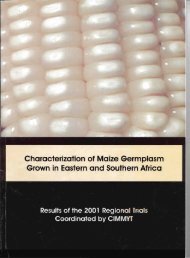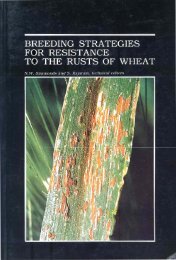Proceedings of the Fifth Asian Regional Maize Workshop - Search ...
Proceedings of the Fifth Asian Regional Maize Workshop - Search ...
Proceedings of the Fifth Asian Regional Maize Workshop - Search ...
Create successful ePaper yourself
Turn your PDF publications into a flip-book with our unique Google optimized e-Paper software.
J<br />
i-----1'-_.,-_I........<br />
i M*iIBiaBI<br />
....<br />
=_w_iP*_ia--'-_-.._---..<br />
...<br />
:<br />
III1<br />
-<br />
Fig.9. Framework for viewing interactions between <strong>the</strong> public and private sectors in <strong>the</strong><br />
maize seed industry.<br />
already use hybrid seed and periodically replace older hybrids with newer hybrids.<br />
4.1. Emerging seed markets<br />
In emerging seed markets, public breeding programs carry out most <strong>of</strong> <strong>the</strong> basic<br />
research needed to develop <strong>the</strong> source germplasm used to produce improved OPVs and hybrids.<br />
This was true even in <strong>the</strong> world's largest hybrid maize seed market, <strong>the</strong> USA, where up<br />
until 1950 most <strong>of</strong> <strong>the</strong> inbred lines used in producing commercial hybrids were developed by<br />
breeders working at public universities. Ra<strong>the</strong>r than concentrate on research, <strong>the</strong> first<br />
successful seed companies in <strong>the</strong> USA placed most <strong>of</strong> <strong>the</strong>ir effort in seed production and<br />
marketing. Similar alliances involVing public sector R&D and private sector seed production<br />
and marketing were instrumental in <strong>the</strong> emergence <strong>of</strong> thriving hybrid maize seed<br />
markets in El Salvador, Zimbabwe, Kenya, Malawi, Venezuela, and India. Significantly, in<br />
nearly all <strong>of</strong> <strong>the</strong>se countries public support to research was accompanied by public·support<br />
to education, as government extension services played a major role in publicizing <strong>the</strong><br />
benefits <strong>of</strong> hybrids and promoting <strong>the</strong>ir use.<br />
In emerging seed markets, public policies have <strong>of</strong>ten been important in providing<br />
incentives for private companies to become involved in seed production activities. These<br />
incentives have typically included:<br />
provision <strong>of</strong> free access to improved populations and inbred lines<br />
generated by public research institutions, as well as information<br />
about <strong>the</strong> performance <strong>of</strong> <strong>the</strong>se materials<br />
provision <strong>of</strong> credit and technical assistance to companies to invest<br />
in seed production (since hybrid seed production is skill intensive,<br />
technical training programs are <strong>of</strong>ten important for successful seed production)<br />
introduction <strong>of</strong> realistic policies governing seed certification that<br />
do not restrict <strong>the</strong> availability <strong>of</strong> quality seed to farmers<br />
- establishment <strong>of</strong> liberal foreign investment laws and seed import policies<br />
to facilitate foreign participation in <strong>the</strong> seed industry (multinational<br />
seed companies are <strong>of</strong>ten an important source <strong>of</strong> new technology for seed<br />
production)<br />
218




